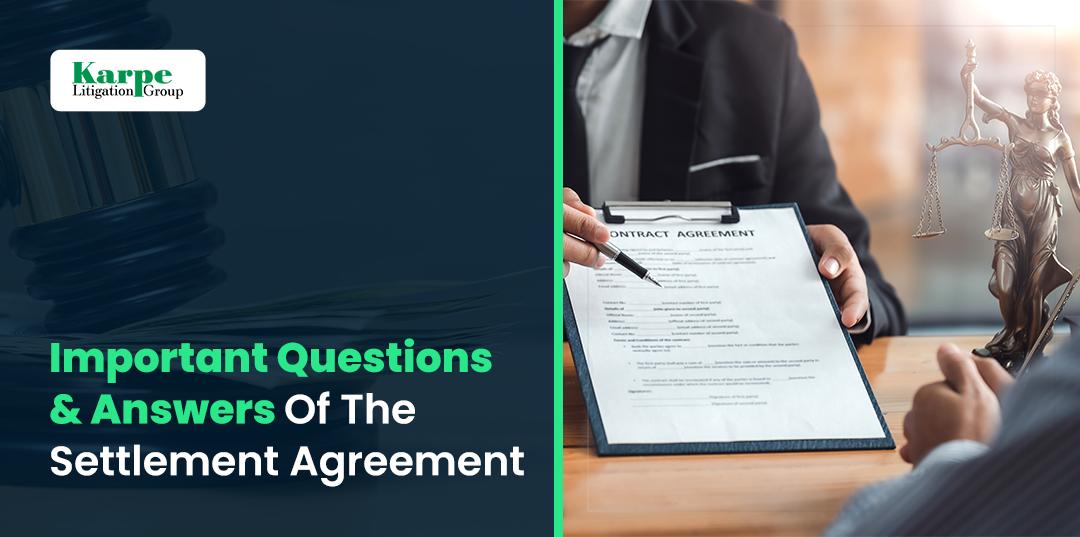
After a personal injury case, the first thing that you, as the claimant, will want to know is how much your award will be and when you will get it. Your Indianapolis personal injury attorney will have a good idea of what your case is worth and can give you an estimate of the amount of your final settlement.
However, there are many different factors that will affect the final value of your case. In order to get the most accurate estimate, your attorney will need more information from you. The following are some important questions that you should be prepared to answer in order to help your attorney give you the best estimate of your case’s value.
1. How long ago was the accident or injury?
The date of your accident is important because it can affect the amount of money you are awarded for pain and suffering. Indiana law requires that any personal injury lawsuit be filed within two years of the date of the accident or injury.
If you wait too long to file your lawsuit, you may be barred from receiving any compensation at all. That’s the reason you should hire an experienced Indianapolis personal injury lawyer to investigate your claim as soon as possible.
2. What is the nature and extent of your injuries?
This is a crucial question because the answer will have a big impact on the amount of money you will get for medical expenses and pain and suffering. You might be asked to provide your medical records and bills, as well as a written statement from your doctor detailing your injuries.
You should also be prepared to describe the pain and suffering you have experienced as a result of your injuries. It is important to be as specific as possible and to keep a journal detailing the day-to-day effects of your injuries.
3. How much have you already spent on medical treatment?
You will be compensated for all of the medical expenses you have incurred as a result of your accident, including any future treatments that may be necessary. Be sure to keep all of your medical records and bills so that your attorney can get an accurate picture of your total expenses.
Sometimes, it becomes difficult for individuals to afford the costs of ongoing medical treatment. If this is the case, your attorney may be able to help you get a letter of protection from your doctor, which would allow you to receive treatment on a lien basis. Your Indiana personal injury lawyer will help you understand your options.
4. Have you missed work because of your injuries?
If you have missed work because of your injuries, you may be able to recover lost wages as part of your settlement. You will need to provide your attorney with documentation, such as pay stubs or a letter from your employer, to support your claim for lost wages.
If you are unable to return to work because of your injuries, you may be able to receive compensation for future lost earnings. Your attorney will support you in pursuing this type of compensation by working with vocational experts and economists. Moreover, in many cases, individuals who are unable to return to work because of their injuries may be eligible for Social Security disability benefits.
5. How has your injury affected your daily life?
Your injuries may have caused you to miss out on important activities and events, or to lose your ability to do things that you once enjoyed. The impact that your injuries have had on your life will be taken into account when determining the value of your case.
It is important to keep a journal documenting the ways in which your injuries have affected your daily life. You should also be prepared to discuss these effects with your attorney. It’s crucial that you go into detail regarding how your injuries have changed your life so that your attorney can accurately convey this information to the insurance company or jury.
6. Are there any other injury factors that should be noted?
In addition to the questions above, there are a number of other factors that may affect the value of your personal injury case. These include the severity of your injuries, whether the other party was wholly or partially at fault for the accident, and whether you contributed to your own injuries by acting recklessly.
It’s important to discuss all of these factors with your Indiana personal injury attorney so that he or she can get a clear picture of your case and advise you accordingly. Moreover, the attorney you choose to represent you will have a big impact on the success of your case, so be sure to select someone with experience handling similar cases.
7. Will signing the settlement case end my case?
On signing a settlement agreement you will be refrained from exercising your rights to be able to carry on with your personal injury claim. If the judge is approving the agreement, that will mark an end to your case.
Thus it is far-reaching that you get advice from your personal injury lawyer before you sign the agreement of settlement. When you are in a personal injury trial, the settlement amount will reinstate the award you ought to receive. When you are agreeing to the settlement, you are losing the right to further pursue the claim. Once you sign the agreement you can not undo your actions. You will have to agree with whatever settlement you will be offered, nevertheless, whether they cover your expenses or not.
8. Can the agreement be changed?
It is extremely strenuous to change the agreement of settlement once you have signed it and it is accepted by the court of law.
After extensive negotiation, you will be agreeing to a settlement. The goal of the settlement agreement is to bridge the gap between the two parties. Singing the agreement means that there is mutual understanding between the parties. If you want o make any kind of changes, you will need the consent of the opposition. You can not change or dissolve the agreement if:
1. It is a “take-it or leave-it” deal.
2. There is a sign of swindling.
3. The agreement is misinterpreting the facts.
4. The agreement was built in mistrust.
9. Can I negotiate with the terms of a settlement offered?
Yes, you can negotiate. However, the insurer is keen on keeping the information off-records.
If you are not happy with the settlement offered, make counteroffers. Through some more negotiations, both the party can reach a point where they feel that no one is being deprived of anything.
It is suggested that you take the help of a lawyer to negotiate with your insurers. Insurers will make it seem like their first offer is their final offer, let your lawyer do the trick and negotiate with them. The first settlement offered is usually very low and will not cover your expenses.
10. How can the settlement money be paid out?
There are usually two processes if paying the settlement money:
1. Paying altogether as a lump sum- The plaintiff may receive the lump sum money as a single check. The amount might be thousands of dollars paid at once.
2. Paying in installments- The plaintiff will receive the compensation over a certain time frame. All the details about the payment will be jotted down in the agreement.
Your settlement agreement will have a clause where it will be ruled out how you will be receiving the compensation. However, each method is subjected to tax implications.
11. Will a court enforce the agreement?
The agreement becomes incorporated into the system of the court once signed by the plaintiff and the defendant, and further, approved by the court.
The terms that are stated in the settlement agreement become indispensable. If the agreement is open to interpretation, you will experience disputes in the course of the process. Ensure that the settlement is strongly drafted or you will be facing ambiguities. You might land up in a situation with a different lawsuit calming the violation of the agreement.
How can your attorney streamline the process for you?
Apart from these questions, it’s crucial to understand how your attorney can make it easier for you to get the compensation you deserve. Your attorney can streamline various processes for you, including.
1. Filing a personal injury lawsuit
If you decide to file a personal injury lawsuit, your attorney will be by your side throughout the entire process, from filing the initial complaint to negotiating the injury settlement or taking your personal injury case to trial.
2. Dealing with the insurance company
Many people choose to handle their personal injury claims on their own, without the help of an attorney. However, this is often a mistake, as insurance companies are notoriously difficult to deal with. Your personal injury lawyer in Indianapolis will be able to communicate with the insurance company on your behalf and negotiate a fair settlement.
3. Managing your medical treatment
Your attorney can also help you get the medical treatment you need by referring you to reputable doctors and specialists. This is important, as getting proper treatment is essential to making a full recovery.
4. Calculating your damages
One of the most important aspects of personal injury cases is calculating the value of your damages. This can be a complex process, as it takes into account both economic and non-economic damages. Your attorney will be experienced in calculating the value of your damages and will be able to get you the maximum amount of compensation possible.
Contact Karpe Litigation Group today!
When you’re injured in an accident, the last thing you want to do is deal with the legal process of filing a personal injury claim. However, by working with an experienced Indianapolis personal injury attorney, like Karpe Litigation Group, you can streamline the process and focus on your recovery.
We have years of experience handling personal injury cases at Karpe Litigation Group and a proven track record of success. We understand the ins and outs of the personal injury claims process and will do everything we can to get you the compensation you deserve.
Wrapping up!
These are just some of the important questions & answers to the settlement agreement. However, every case is different, so discussing your specific case with an experienced personal injury attorney is important. At Karpe Litigation Group, we offer free consultations to get you started.
Frequently Asked Questions
-
1. What is a personal injury settlement?
A personal injury settlement is an agreement between you and the at-fault party to resolve your personal injury claim. The settlement will typically involve the at-fault party paying you a sum of money, which you will then use to cover your medical expenses, lost wages, and other damages.
-
2. How much is my personal injury case worth?
The value of your personal injury case will depend on a number of factors, including the severity of your injuries, the number of your medical expenses, and whether you suffered any lost wages. An experienced Indianapolis personal injury attorney like Karpe Litigation Group will be able to evaluate your case and give you an estimate of its value.
-
3. What is the statute of limitations for filing a Personal injury claim in Indiana?
The statute of limitations is the deadline for filing a personal injury claim. In Indiana, the statute of limitations for personal injury claims is two years from the date of the accident. This means that you have two years from the date of the accident to file a personal injury claim.
-
4. How do I choose a personal injury lawyer?
There are a few things you should look for when choosing a personal injury lawyer, including experience, results, and reviews. At Karpe Litigation Group, we have years of experience handling personal injury cases and have a proven track record of success.
-
5. What should I do if I’m in an accident?
If you’re involved in an accident, the first thing you should do is seek medical attention. Even if you don’t think you’re injured, it’s important to get checked out by a doctor. Once you’ve seen a doctor, you should then contact an experienced Indianapolis personal injury lawyer like Karpe Litigation Group to discuss your case.
-
6. Benefits of hiring Indianapolis best personal injury lawyers?
As we all know, dealing with legal matters is a big headache and for a victim, it’s very tough work. Make that work easy by hiring the best Indianapolis personal injury lawyers as they help the victim to get the best amount of compensation for their damages with insurance companies, and legally deal with other parties involved in the case.
-
7. Do personal injury attorneys answer questions during free consultations?
Yes. Most Indianapolis personal injury attorneys provide free initial consultation services where you can meet them and ask questions before hiring them.
-
8. How can the Karpe Litigation Group help me?
Karpe Litigation Group is an experienced personal injury law firm in Indianapolis, Indiana having expertise in helping clients get justice and reimbursement in various practice areas. We assure success in court and don’t charge a penny before you win the case and till you get a good compensation amount.





